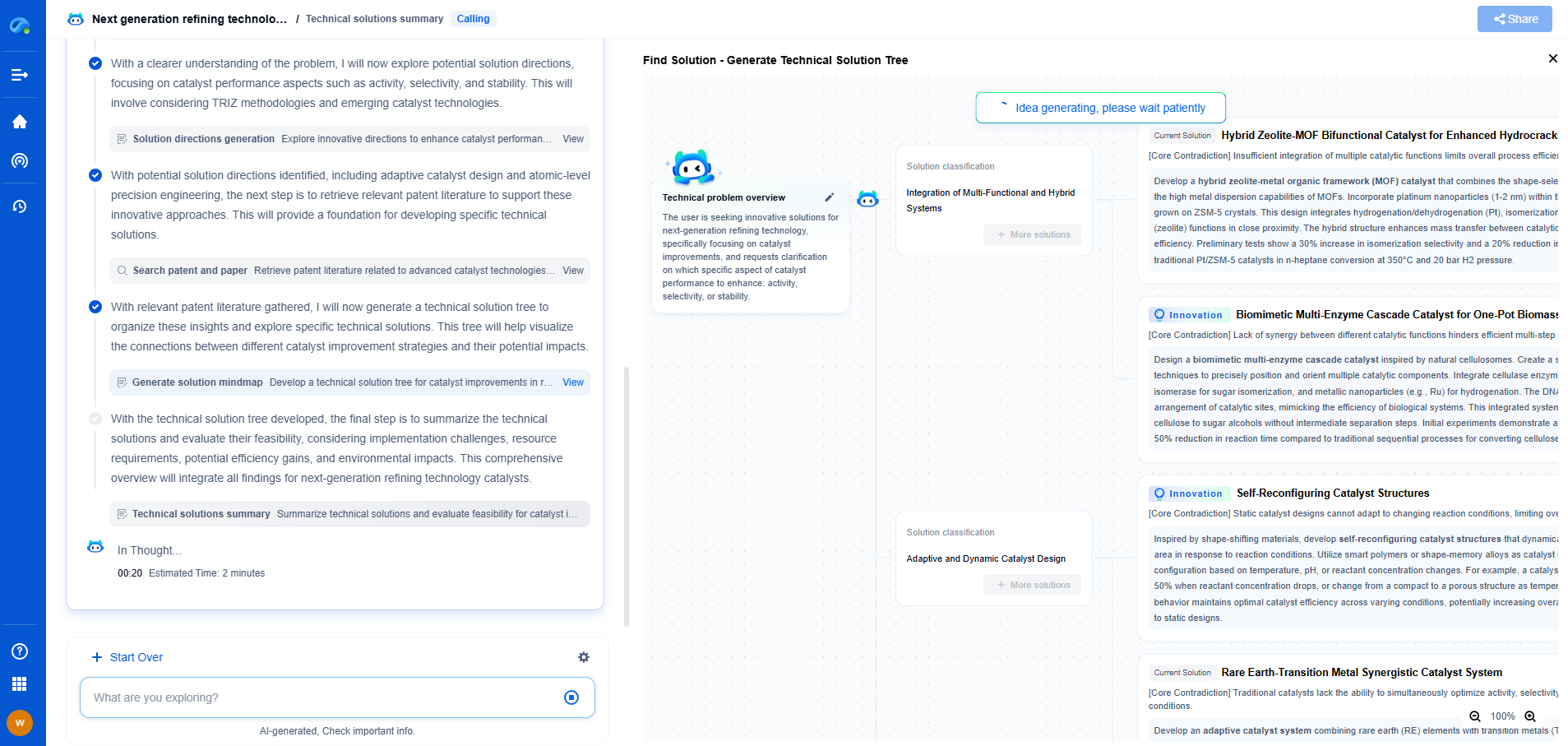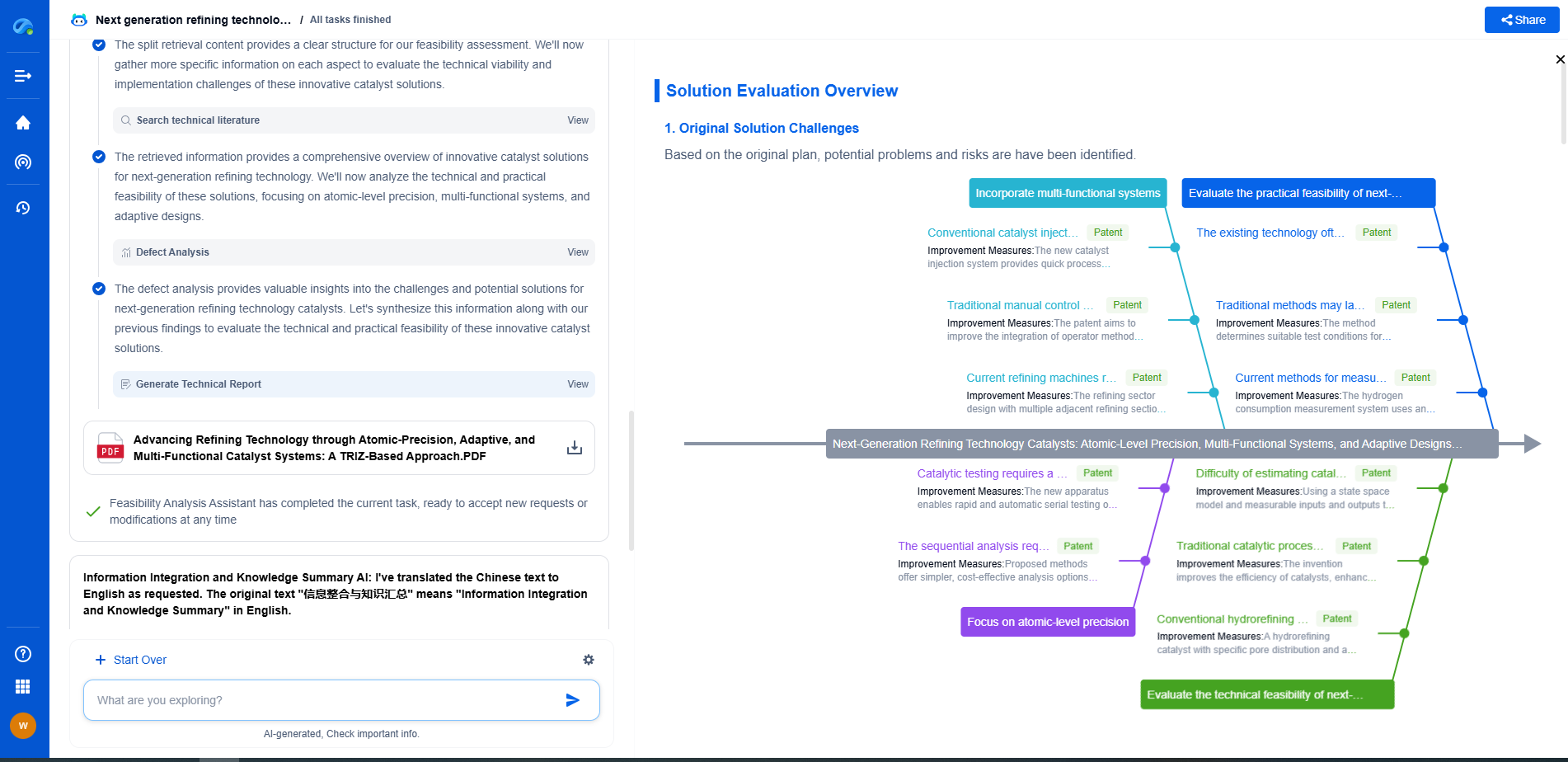Wireless Tracking and Predictive Maintenance: Building an End-to-End Smart Gas Cylinder System
JUL 21, 2025 |
The integration of technology into everyday objects has revolutionized various industries, and the gas cylinder sector is no exception. With the advent of wireless tracking and predictive maintenance, smart gas cylinder systems are becoming increasingly popular. These systems provide enhanced safety, efficiency, and cost-effectiveness, offering significant improvements over traditional methods of gas cylinder management.
Wireless Tracking Technology
Wireless tracking is at the heart of smart gas cylinder systems. This technology relies on sensors and communication networks to monitor the location and status of gas cylinders in real-time. RFID (Radio Frequency Identification) and GPS (Global Positioning System) are commonly used to track the movement of cylinders from the supplier to the end-user.
RFID tags are attached to each cylinder, allowing them to be scanned and recorded at various checkpoints. This not only helps in inventory management but also aids in preventing loss or theft. GPS technology, on the other hand, enables real-time tracking of cylinders during transportation. This ensures timely delivery and allows for dynamic rerouting in case of any logistical challenges.
Enhancing Safety and Efficiency
One of the primary benefits of wireless tracking is enhanced safety. Traditional gas cylinder management systems rely heavily on manual checks, which are prone to human error. In contrast, smart systems continuously monitor cylinder pressure, temperature, and other critical parameters. If any irregularities are detected, alerts are immediately sent to the concerned personnel, allowing for prompt action to prevent accidents.
Efficiency is also significantly improved with the implementation of wireless tracking. Automated inventory management ensures that gas cylinders are always available when needed, reducing downtime and increasing productivity. Furthermore, the data collected from tracking systems can be analyzed to optimize delivery routes, leading to reduced fuel consumption and lower operational costs.
Predictive Maintenance: A Game Changer
Predictive maintenance is another critical component of smart gas cylinder systems. By analyzing historical data and current operating conditions, predictive algorithms can forecast when a cylinder is likely to require maintenance or replacement. This proactive approach helps in preventing unexpected failures and extends the lifespan of the cylinders.
Predictive maintenance also offers financial benefits. By minimizing unscheduled downtimes and optimizing maintenance schedules, companies can significantly reduce maintenance costs. Moreover, the ability to predict maintenance needs ensures that cylinders are serviced before they become a safety hazard, further enhancing the reliability of the system.
Data Analytics and Insights
The vast amount of data generated by smart gas cylinder systems provides valuable insights for businesses. Advanced analytics tools can process this data to identify trends, patterns, and anomalies. For instance, data analysis can reveal usage patterns, helping companies to better understand customer needs and adjust their supply accordingly.
Additionally, predictive analytics can assist in demand forecasting, ensuring that gas supply aligns with market demand. This not only enhances customer satisfaction but also helps in optimizing inventory levels, reducing waste, and improving overall operational efficiency.
Challenges and Future Prospects
Despite the numerous advantages, implementing a smart gas cylinder system is not without challenges. Initial setup costs can be high, and there may be resistance to change from employees accustomed to traditional methods. Furthermore, integrating new technologies with existing infrastructure can be complex and require significant technical expertise.
However, the benefits of wireless tracking and predictive maintenance far outweigh these challenges. As technology continues to evolve, the cost of implementation is expected to decrease, making smart systems more accessible to a broader range of businesses. Additionally, ongoing advancements in IoT and AI are likely to enhance the capabilities of these systems, offering even greater efficiency and safety improvements in the future.
Conclusion
In conclusion, wireless tracking and predictive maintenance are transforming the way gas cylinders are managed. By providing real-time visibility, enhancing safety, and optimizing maintenance, smart gas cylinder systems offer significant advantages over traditional methods. As the technology continues to advance, it is poised to become an integral part of the gas cylinder industry, driving efficiency and innovation. Businesses that embrace these technologies will be well-positioned to stay ahead in an increasingly competitive market.
As clean energy and decarbonization drive new breakthroughs in hydrogen storage, CO₂ transport, and alternative gas carriers, keeping pace with technical trends and patent activity is critical to staying competitive.
Patsnap Eureka helps innovators in compressed gas storage, high-pressure tank design, gas sensor systems, and pipeline materials accelerate research by offering instant, AI-powered insights into global patents, related technologies, and emerging white spaces.
🚀 Bring speed, precision, and strategic foresight to your innovation and IP decision-making in the gas transport sector—try Eureka today and unlock a smarter path forward.
- R&D
- Intellectual Property
- Life Sciences
- Materials
- Tech Scout
- Unparalleled Data Quality
- Higher Quality Content
- 60% Fewer Hallucinations
Browse by: Latest US Patents, China's latest patents, Technical Efficacy Thesaurus, Application Domain, Technology Topic, Popular Technical Reports.
© 2025 PatSnap. All rights reserved.Legal|Privacy policy|Modern Slavery Act Transparency Statement|Sitemap|About US| Contact US: help@patsnap.com

